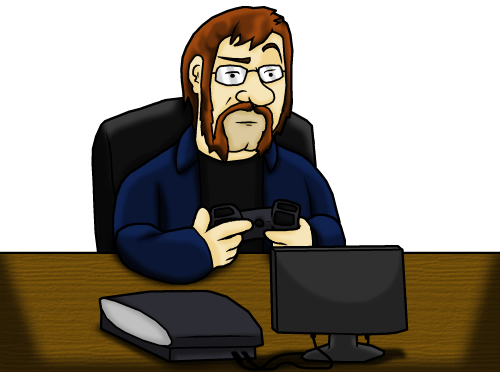Video Game Scavenger Hunts, a.k.a the Art Director Really Wants You to Appreciate Their Hard Work
Were scavenger hunts ever fun in games? Is there nothing more tedious than scouring a digital landscape for small digital tokens? Look, I get it: it took sodding ages to create these digital worlds and one way to make sure that the player appreciates every corner of the map (and simultaneously pad out the game’s lifespan in terms of time spent being played) is to hide a whole bunch of stuff and send the player to go find it all.
I admit that I’m probably one in five players who actually bother to pursue these scavenger hunts. I’ve got a little bit of an OCD problem when it comes to completing games and finishing trophy sets to 100%, and I’m sure most well-adjusted gamers don’t waste hours following maps on the internet to collect all the pointless items a game might feature. I can’t help it, it’s usually an easy trophy and I’m the one stupid enough to spend time doing them (first world problems, I know).
I’m going to touch on a whole bunch of scavenger hunts I’ve undertaken, and you can read along and shake your head in disappointment at what I’m willing to do to fill my spare time.
Grand Theft Auto
One of my biggest geek claims to fame is that I completed the three PS2 Grand Theft Auto games (and GTAIV on the PS3) to 100%. This has only ever impressed one person, and we were both about fifteen at the time. Now it’s just one of my guilty prides that I hold because if you’ve ever played a Grand Theft Auto game you’ll appreciate how massive these games are and how much there is to do in each one. For 100% you usually have to do everything the game offers and this will usually include (surprise!) a scavenger hunt. It’s usually pretty egregious too, given how big the GTA worlds are and the fact that the design team always secretes hidden items in some really awkward places.
- GTA3 had hidden packages of cocaine, about a hundred of them. I remember having to restart the game around 80% completion (that’s after doing all the story missions too) because one was hidden on a petrol station and to get to it you had to walk up a thin high ledge, and I couldn’t walk along the ledge because the local mafia was pissed at me and would often open fire, knocking me off. On reflection I could have probably flown the useless plane to get on to the petrol station roof (as I got fairly good at flying it).
- GTA: Vice City had more hidden packages, this time cocaine hidden inside little Inca trinkets (not quite sure what the movie reference was there, if I’m honest).
- GTA: San Andreas was four times bigger than the previous two games, so the design team did the maths and decided to include four different sets of scavenger hunts (for real). Each of the three main city locations had their own collectables, and there was one set which was spread over the entire map underwater, because you could swim in this game and by god will you appreciate the hell out of and use this new mechanic! One of the hunts was for gang tags to spray over, another was locations to take tourist photographs of various locations at specified markers (which you could only see when you looked through a bloody camera at them), the third was horseshoes (because…Vegas! Need all the luck you can get) and the fourth, underwater-based set was oysters. I’m fairly certain that last set was just to take the piss, really.
- GTAIV went in a completely different direction, with pigeons. Pigeons with inexplicable red lights on them. There’s no context here for why Niko Bellic, immigrant in Liberty City, would take it upon himself to shoot 200 pigeons around the city, unless it’s like a Batman thing and it turns out pigeons killed his parents. The only possible explanation is that he really hates pigeons. I hated hunting for pigeons because a) every time you kill one a nearby policeman might hear the gunshot and try to arrest you, and b) some of the pigeons are hidden in places you’d never find without a map e.g. inside the upper stories of inaccessible buildings, on top of massive skyscrapers, in restricted areas that bump you up to terrorist level wanted the minute you step in them, etc.
The benefits of collecting these packages/doing these tasks? Often there’s extra weapons that will appear at your hideout, stat boosts (I think the oysters boosted your character’s sex appeal meter, if you follow the logic) and the extra 10% towards your 100% completion rate. What the developers also did, just to be utter bastards, was use the collectibles as a tool to prevent dirty cheaters from completing 100% and getting the great rewards one gets for doing so (usually a tank, bodyguards, a t-shirt with “I completed the game 100% and all I got was this lousy t-shirt” – that’s one of my favourites). If you used a cheat code in the game, one of the hidden packages would disappear from your game, forever. I confirmed this on a saved game belonging to my girlfriend’s brother, who was trying to get 100%; after half an hour of trying to locate what should have been an obvious package, I found out he’d been cheating to get ammunition.
On the plus side, GTA always has some nice scenery, and it’s nice to see how much effort goes into these massive worlds.
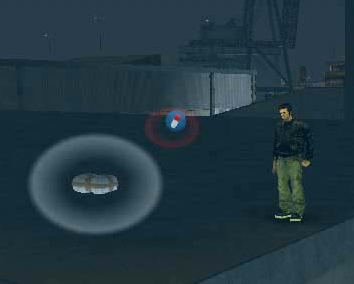
Red Dead Redemption
Another Rockstar game, RDR was basically GTA set in the wild west. Grand Theft Horse, to quote the thousands of unoriginal game journalists who coined the phrase. Unusually for a Rockstar sandbox game, there were no hidden packages! Instead, it presented you with a vast open Western frontier and said “here’s a list of animals, go kill them”. Hunting animals and challenges made up the meat of the scavenger hunts. Hunting was fun, especially when you start taking on lightning-fast cougars and bears with thick hides (sometimes using only a knife), but they were offset by the boring collection fests that were plant collecting. There’s nothing more dull than scouring the open frontier for specific kinds of herb or bush.
As an added bonus, if you installed the Undead Nightmare expansion pack you got the opportunity to hunt zombie cougars and zombie bears (you gotta shoot them in the head!) as well as find, catch and tame unicorns and the Four Horses of the Apocalypse (awesome!). There’s also a rather macabre Bigfoot encounter I don’t wish to spoil, but if you’re really interested then take a gander at this video here.
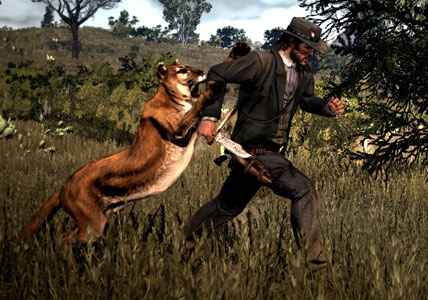
[PROTOTYPE]
I had a love-hate relationship with Prototype. On the one hand it was a complete sandbox experience playing a character with over-the-top mass-killing superpowers where you had little cause for restraint, and on the other hand it was an ugly, repetitive experience with heaps of bugs that tended to ruin the enjoyment somewhat. The console port in particular had problems where some of the gliding challenges were rendered damn near impossible because of the response differences between a game controller and mouse/keyboard; the challenge timers were not adjusted for consoles to account for the fact that glide paths with a controller just weren’t as easy to change mid-glide. See the video below for one challenge in particular that made me want to launch the game disc from my window.
This guy makes it look easy, but you try doing 180-degree turns with a sodding analogue stick.
Being a typical sandbox game, Prototype went the extra mile by including two scavenger hunts (not including hunting around for challenge and story markers, which would bring the total up to about seven, joy!). One of these particularly annoyed me because it involved finding markers attached to New York landmarks. This insinuated that, in-between trying to piece together his lost memories, stop the mutated hordes from growing and uncovering the vast government conspiracy, the protagonist Alex Mercer was taking time out of his busy schedule to take in the sights. Horrible mutant anti-heroes are not ideal tourists.
The other hunt was for “hints”. If there’s a staple of video games that needs to die, it’s annoying pop-up hints that state the obvious. Prototype made you actively seek these out, which means that by the time you’ve already collected a certain hint, you’ve probably played the game long enough to already know all about whatever information the hint contains. That’s genuinely idiotic. That’s like a Sonic the Hedgehog game telling you how to jump on the second-to-last level: redundant and far too late to be useful.
One of the non-superfluous scavenger hunts I did like just because of the sheer novelty was called “the web of intrigue”. To advance the plot Alex needed to find certain individuals who had knowledge and consume them and their memories (the “memories” consisting of a short 30 second bit of dialogue and some relevant images). This made piecing together the mystery more interesting as you unlocked parts of the background story. The downside was that it was a pain in the backside to find specific people as they tended to appear randomly in certain areas (and some would only appear after set points in the game), so even the online maps people had created were of little use. Unless you were specifically trying to complete the web of intrigue, it was easy to be undertaking a mission only to fly past one of the people to consume at top speed, which was just frustrating. There’s nothing worse than having to come back later.
I still resent Prototype a little for being at the top of my trophy list because the first character in its name is “[“.
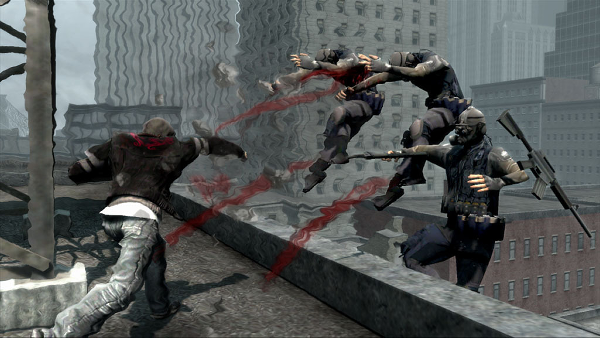
inFAMOUS
inFamous was the sandbox game that came out around the same time as Prototype around a similar concept – you’re a guy with superpowers running around an open-world type city trying to uncover a conspiracy. Yahtzee of the Escapist did a twin review of Prototype and inFamous which infamously (see what I did there) ended with a contest to see which game design team could make the girliest picture of the opposite design team’s lead character.
I didn’t really see that it was much of a contest as inFamous was PS3 exclusive, meaning that Prototype probably had the bigger market share just by virtue of being multi-platform. Much like the result in Yahtzee’s contest, I felt that inFamous was the more polished product, but then it did everything on a far smaller scale; your powers weren’t as devastating, the villains weren’t as oppressive (being mostly guys with guns as opposed to Prototype’s bulging dog mutant things) and the story was more constrained to a linear progression in contrast to Prototype’s web-of-conspiracies model.
Another sheen on inFamous’ layer of polish came in the form of the obligatory scavenger hunts, of which there were two. Rather than just set you random tasks for experience points like in Prototype, inFamous actually incorporated the hunts into its story.
The first collection hunt consisted of finding small message drops around the map. Finding one would net you some experience points, but more importantly would fill in some of the back-story. Given that inFamous had a genuinely enthralling story centred around the machinations of a sinister organisation creating superhuman mutants for nefarious purposes, these nuggets of back-story filler were much appreciated.
The second hunt was for “blast shards”. The game starts with a massive explosion, which is what gave the main character his powers. By collecting irradiated shrapnel from the blast, he could expand his power potential. They basically increased your power gauge with every five collected, and were crucial if you wanted to sustain longer attacks on enemies without having to scamper to the nearest lamppost or car in order to suck up more electricity.
What really made inFamous the better game was, uniquely among sandbox games, the fact that the map for finding these items was incorporated into the game. By pressing down on the right stick the main character would let out a sonar-like wave that would mark nearby shards on to the mini-map on the game’s HUD for a few seconds. This meant not having to go online to find a map someone had made and was far more enjoyable as it was built in as a game mechanic.
inFamous 2 did much of the same, but for some reason the message post drops were replaced with pigeons carrying recorded messages on them.
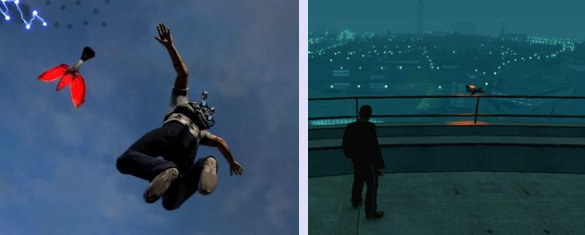
Batman: Arkham Asylum and Batman: Arkham City
I f*cking love Batman. I’ve put “Batman” down as my religion many times. It goes without saying that these games are awesome (and made in England, to boot!).
The true beauty of the scavenger hunts in these Batman games is that you wouldn’t even realise that you’re doing a scavenger hunt most of the time. Whether you’re solving the Riddler’s riddles (the cream on the cake for Batman fans as it means utilising their geeky comic knowledge to find hidden easter eggs tied to Batman lore to solve riddles), finding Amadeus Arkham’s secret messages, following the trail of a killer as he leaves disfigured bodies in alleyways, racing to payphones for a deluded madman in a Die Hard 3-esque game of cat and mouse, popping Joker’s decorative balloons (Batman hates balloons), smashing security cameras, interrogating Riddler’s informants or trying to find Mr. Freeze’s kidnapped wife, they were all scavenger hunts in one way or another.
I could spend another 200 words easily praising this game, but I won’t (another blog post for another day, perhaps?). I’ll admit that I did have to resort to using a map for both games, but I didn’t mind as finding each part of a hunt was the easy part – there would often be a challenge or a means of getting to the item once you’d got to the location that was the real meat of the challenge.
Also, you were Batman. Which makes everything awesome. BATMAAAAAAN
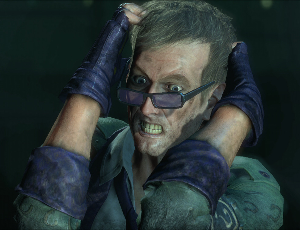
Fallout 3 and Fallout: New Vegas
I’ve extolled the virtues of playing the Fallout games in another post, but there’s one element particularly dire about the modern1 Fallout games I didn’t mention. Given the subject of this article, can you guess what that one dire element might be, hmm?
The Fallout games are absolutely massive. We’re talking about fully rendered 3D worlds here, full of people and items to interact with. People should be more surprised when they find bugs in these things, as these games are so massive that it would be damn near impossible to fully quality test the games, by my reckoning. No wonder save files can balloon to over 1MB, there’s a lot of information to record – where dead bodies are left, what items have been moved from their default positions, where items have been put, what quests have been performed…it all tallies up!
The one terrible idea with the Fallout games is to include a scavenger hunt. It means that you’re literally looking for a tiny needle in one massive state-sized haystack. It is, as far as I’m concerned, unfair2 to expect a player to find anything in these worlds without a guide. To make matters worse, it’s actually possible to miss collecting some of these items if you pass a point in the game and don’t pick an item up while you’re there. To an obsessive-compulsive gamer like myself, that sometimes means having to reload old saves (I’ve lost hours of game progression to this sort of thing before) or, in dire circumstances, starting over from scratch (see Grand Theft Auto 3, above). That’s a pretty crappy outlook on game design to propose that someone playing your game must be always alert or miss out. In fact, more on this when we get on to a certain Japanese Role-Playing Games series…
Anyway, some of the quests in the Fallout games require you to find collectible bobble-heads (to increase your character stats), snow globes and, I shit you not, tiny bottle caps. As in actual bottle caps off of bottles. And not just any caps either – caps are the main currency of the game, so it has to be specially marked bottle caps. Go chew my nut sack, Bethesda.
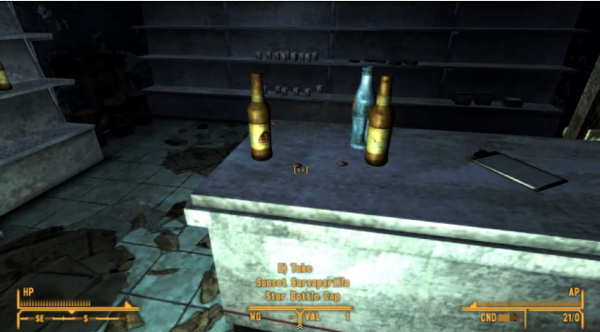
True Crime: Streets of L.A.
One from the PS2 days, a clone of Grand Theft Auto which had you playing a smart-talking cop. One scavenger hunt (one I actually didn’t do) had you collect bones scattered around a digital recreation of L.A. (a sodding massive map!). If you collected all of them you got to play as Snoop Doggy Dogg, who went around in his pimp mobile fighting crime. Makes sense, I suppose?3
Truly, we have not yet passed this epitome of gaming as a medium.
Assassins’ Creed
I was spared the scavenger hunt of the first Assassin’s Creed, a flag collecting side quest that was even mocked in the manual as being a stupid pointless waste of time. Because the PS3 didn’t have trophies at that point in time (as Sony hadn’t yet decided to steal Microsoft’s/Valve’s Achievement concept), I didn’t feel obliged to collect all of them. There were probably a few hundred spread out amongst the game’s three cities and the intervening travel space, but whatever. Again, even the game’s manual said it was a pointless waste of time, which was a nice admission on the game developer’s part.
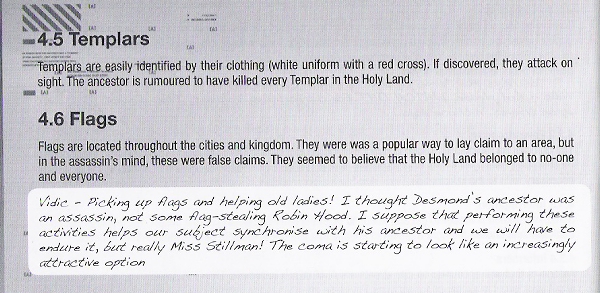
Assassin’s Creed II (a.k.a. Ezio Fist-Fights the Pope) had trophies, so I ended up collecting feathers and flags across the game. On the plus side, these did nab you some pretty sweet gear. Assassin’s Creed 2.1 (Brotherhood, a.k.a. Ezio Does Da Vinci) decided to hide the flags not just in the main city location but within missions as well so I said to myself “f*ck that shit” and went back to playing Batman instead. Because I didn’t get around to finishing the game I never bought the following instalment of Assassin’s Creed 2.2 (Revelations, a.k.a. Ezio Goes Norse) so LET THAT BE A LESSON TO YOU, UBISOFT. You French gits.
L.A. Noire
I waited about three years following the announcement of this detective-’em-up for the game to be released. If you’ve wandered around my site you might have noticed my affinity for a certain dark detective game, so this announcement was like a dream come true. For a while it looked as if the game wouldn’t get released because of financial difficulties, and then Rockstar games (the GTA guys) stepped in and threw money at the project until it was released.
It was an acclaimed game on the grounds that it was a return to the adventure game genre of old, and the face-recreation technology was ground-breaking. The game had it’s share of problems (most of the investigation process came down to “eeny meeny miny mo”) and it came out afterwards that the guy running Team Bondi, the game’s development team, was something of a dictatorial arsehole who hadn’t taken kindly to Rockstar’s intervention on his little project.
L.A. Noire didn’t really need a scavenger hunt. It’s a fully realised 1950s-era L.A., the kind of thing Raymond Chandler wrote about. As such, most of the game is led by its story and the investigations. For some reason the development team hid a bunch of gold film reels with titles on them around the map for you to find. Collecting them doesn’t unlock anything, it doesn’t show you a clip of the film in question, it doesn’t serve any purpose. Hell, I didn’t find any of the things until late in the game: I was investigating the abandoned kill shed of a murderer, only to find a film reel randomly sat on his porch. That killed the suspension of disbelief, I’ll tell you.
At worst, finding the film reels actually ruined the game world because by exploring its crevices you realised that, actually, there’s quite a lot of copy and paste going on around here. A lot of these houses are very boring indeed. Once you’ve seen one 1950s suburban neighbourhood, you’ve seen all of them (literally, in this case).
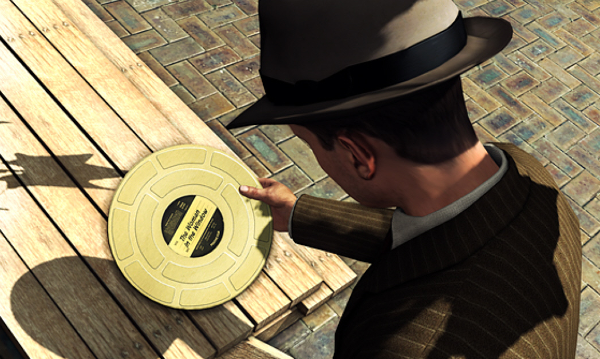
FINAL GODDAMN FANTASY
FFFFFFFFUUUUUUUUUUUUUU-
- Assign scavenger hunts to all the best items in the game.
- Make each item a scavenger hunt in itself (scavenger-ception, if you will).
- Don’t tell the player how to progress on the scavenger hunt, in fact don’t tell them about any of them.
- Make it possible to miss certain items if you do not collect them at a certain point in the game.
- Make it so that collecting items from one hunt at a certain point in the game makes it impossible to collect items needed for other scavenger hunts.
- Hide some items behind time sink monotonous mini-games that make you restart them if you mess up just once.
- Make some of the items be guarded by Boss monsters that can kill you just by (literally) breathing on you.
- Make it so that, even if you complete a hunt to collect the Amazing Sword of Naz’gruth for your main character, you can only attain the sword if you then speak to a certain character before a certain point in the game, because after that point the character you need to talk to dies.
- What’s that? The character’s already dead? Bad luck. No old saves? Best start over! Kiss goodbye to those 60+ hours you spent playing!
That’s your average Final Fantasy scavenger hunt. The Japanese are sadists.
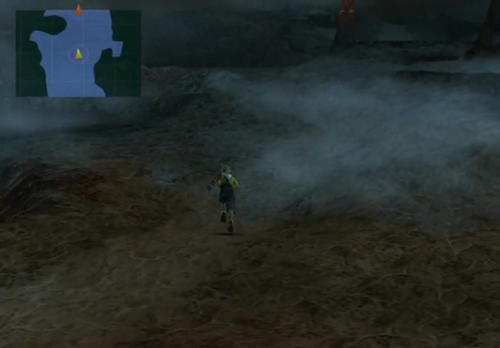
Minecraft
The entire game is built around scavenger hunts. How the hell did Notch make a tonne of money from this again? Oh right, you can build giant erect penises. BEST GAME EVER.
I don’t want to even admit how much time was spent finding and collecting the resources to build all that stuff.
In Conclusion
Collecting items is a significant part of video game design, but it’s no fun if you put 100+ items in a game and tell the player that they’ve got to find them all if they want cool stuff/100%/a trophy achievement. Put some effort in for Christ’s sake. Oops, forgot my religion there, I meant for Batman’s sake.
Also, scavenger hunts are really mean on gamers with OCD. Game developers, I beg of thee, think of the obsessives out there. Just say “no” to scavenger hunts.
Postscript (24/05/15)
OCD regarding video games is a real thing – just read this excellent piece from a woman called Holly Green on Polygon regarding her OCD tendencies. I actually identify with quite a lot of what she writes about, particularly the bit about “learning to let go” of certain things – for instance I’ve come to terms with the fact that, for some games, I’ll probably never get that coveted 100% trophy collection.
- I have to say the modern games as I haven’t played the original games and they are probably awesome and don’t have this flaw. Maybe. Buy it and try it out for yourself, then you can tell me I’m wrong. ↩
- Note that I didn’t use the phrase “impossible” as I’m sure there’s someone out there with the time to find all these things without resorting to a little bit of support/cheating. ↩
- No of course it doesn’t make a god damn lick of sense, it’s one of the stupidest things I’ve ever seen in a video game. ↩
Post by Sean Patrick Payne+ | May 16, 2012 at 12:19 am | Articles, Trophy Hunter's Club, Video Games | No comment
Tags: Arkham Asylum, Arkham City, Assassin's Creed, Batman, Bethesda, bitching about video games, Fallout 3, Fallout: New Vegas, Final Fantasy, Grand Theft Auto, inFamous, L.A. Noire, Minecraft, Red Dead Redemption, Rockstar Games, scavenger hunts, Square-Enix, trophies, True Crime: Streets of L.A., [PROTOTYPE]
